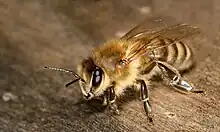méh
Hungarian

The Carniolan honey bee Apis mellifera carnica
Pronunciation
- IPA(key): [ˈmeː] (if it has no suffix or if its suffix starts with a consonant, e.g. méhből, especially in the meaning of ’bee’)
- IPA(key): [ˈmeːɦ] (in inflected forms when followed by a vowel, e.g. méhek)
- IPA(key): [ˈmeːx] (another pronunciation variant, regardless of any subsequent sounds, especially in the meaning of ’womb’)[1]
- Rhymes: -meː, -eːx
Etymology 1
From Proto-Finno-Ugric *mekše. Cognates include Finnish mehiläinen.
Alternative forms
- méhe (dialectal)
Noun
méh (plural méhek)
Declension
The singular instrumental and translative case may differ depending on the dialect. When the word is pronounced with a silent H, they are méhvel and méhvé, respectively, but for speakers who pronounce the H, the corresponding forms will be méhhel and méhhé.[2]
| Inflection (stem in -e-, front unrounded harmony) | ||
|---|---|---|
| singular | plural | |
| nominative | méh | méhek |
| accusative | méhet | méheket |
| dative | méhnek | méheknek |
| instrumental | méhvel | méhekkel |
| causal-final | méhért | méhekért |
| translative | méhvé | méhekké |
| terminative | méhig | méhekig |
| essive-formal | méhként | méhekként |
| essive-modal | — | — |
| inessive | méhben | méhekben |
| superessive | méhen | méheken |
| adessive | méhnél | méheknél |
| illative | méhbe | méhekbe |
| sublative | méhre | méhekre |
| allative | méhhez | méhekhez |
| elative | méhből | méhekből |
| delative | méhről | méhekről |
| ablative | méhtől | méhektől |
| non-attributive possessive - singular |
méhé | méheké |
| non-attributive possessive - plural |
méhéi | méhekéi |
| Possessive forms of méh | ||
|---|---|---|
| possessor | single possession | multiple possessions |
| 1st person sing. | méhem | méheim |
| 2nd person sing. | méhed | méheid |
| 3rd person sing. | méhe | méhei |
| 1st person plural | méhünk | méheink |
| 2nd person plural | méhetek | méheitek |
| 3rd person plural | méhük | méheik |
Declension
| Inflection (stem in -e-, front unrounded harmony) | ||
|---|---|---|
| singular | plural | |
| nominative | méh | méhek |
| accusative | méhet | méheket |
| dative | méhnek | méheknek |
| instrumental | méhvel | méhekkel |
| causal-final | méhért | méhekért |
| translative | méhvé | méhekké |
| terminative | méhig | méhekig |
| essive-formal | méhként | méhekként |
| essive-modal | — | — |
| inessive | méhben | méhekben |
| superessive | méhen | méheken |
| adessive | méhnél | méheknél |
| illative | méhbe | méhekbe |
| sublative | méhre | méhekre |
| allative | méhhez | méhekhez |
| elative | méhből | méhekből |
| delative | méhről | méhekről |
| ablative | méhtől | méhektől |
| non-attributive possessive - singular |
méhé | méheké |
| non-attributive possessive - plural |
méhéi | méhekéi |
| Possessive forms of méh | ||
|---|---|---|
| possessor | single possession | multiple possessions |
| 1st person sing. | méhem | méheim |
| 2nd person sing. | méhed | méheid |
| 3rd person sing. | méhe | méhei |
| 1st person plural | méhünk | méheink |
| 2nd person plural | méhetek | méheitek |
| 3rd person plural | méhük | méheik |
See also
References
- Balázs Sinkovics, Gyula Zsigri: A H-ra vonatkozó megszorítások történeti változásai in A nyelvtörténeti kutatások újabb eredményei vol. 4, JATE Press, 2005
- Section 82e in A magyar helyesírás szabályai, 12. kiadás (’The Rules of Hungarian Orthography, 12th edition’). Budapest: Akadémiai Kiadó, 2015. →ISBN
Further reading
- (bee): méh in Bárczi, Géza and László Országh. A magyar nyelv értelmező szótára (‘The Explanatory Dictionary of the Hungarian Language’, abbr.: ÉrtSz.). Budapest: Akadémiai Kiadó, 1959–1962. Fifth ed., 1992: →ISBN
- (womb): méh in Bárczi, Géza and László Országh. A magyar nyelv értelmező szótára (‘The Explanatory Dictionary of the Hungarian Language’, abbr.: ÉrtSz.). Budapest: Akadémiai Kiadó, 1959–1962. Fifth ed., 1992: →ISBN
This article is issued from Wiktionary. The text is licensed under Creative Commons - Attribution - Sharealike. Additional terms may apply for the media files.